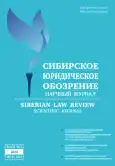Оптимизация состава участников уголовного досудебного производства
- Авторы: Морозова О.С.1
-
Учреждения:
- Сибирский юридический университет
- Выпуск: Том 21, № 2 (2024)
- Страницы: 263-273
- Раздел: УГОЛОВНО-ПРАВОВЫЕ НАУКИ
- Статья опубликована: 21.10.2024
- URL: https://journal-vniispk.ru/2658-7602/article/view/348927
- DOI: https://doi.org/10.19073/2658-7602-2024-21-2-263-273
- EDN: https://elibrary.ru/IHSPZW
- ID: 348927
Цитировать
Полный текст
Аннотация
Одна из основных задач уголовно-процессуального законодательства, наряду с установлением порядка производства по уголовному делу, заключается в точном определении правового статуса и процессуальных возможностей субъектов уголовно-процессуальных отношений, т. е. установлении пределов их прав и обязанностей. В связи с этим необходимо особое внимание уделять характеристике субъектного состава уголовного судопроизводства через создание плана совершенствования их места, роли и процессуального статуса. Цель исследования заключается в анализе правовых проблем, имеющих отношение к реализации рядом участников уголовного судопроизводства своих процессуальных возможностей, и определении путей совершенствования субъектного состава уголовного досудебного производства. В статье рассматриваются вопросы, связанные с процессуальным положением следователя и его взаимодействием с процессуальным руководителем и прокурором. Особе внимание уделяется процессуальному статусу лица, в отношении которого производится проверка сообщения о преступлении, раскрывается проблема осуществления уголовного преследования при проверке сообщения о преступлении, исследуются роли и функции педагога и психолога. Кроме того, автор обосновывает идею расширения круга участников досудебных стадий. Методологическую основу работы составили положения общенаучного метода познания, такие как формальнологический, обобщение, анализ, описание, методы общей теории права, уголовного процесса, криминалистики, психологии, педагогики, логики и других наук. В результате были сделаны следующие выводы. При исследовании основных вопросов усовершенствования процессуального статуса участников досудебного производства автор предлагает учитывать следующие положения: распределение ведомственного процессуального контроля и прокурорского надзора в пользу последнего и создание единой формы предварительного расследования; вовлечение подозреваемого на стадии возбуждения уголовного дела; уточнение цели и роли участия в деле педагога и психолога; расширение субъектного состава за счет наделения индивидуальным процессуальным статусом заявителя.
Об авторах
Ольга Сергеевна Морозова
Сибирский юридический университет
Автор, ответственный за переписку.
Email: olga283m@mail.ru
ORCID iD: 0000-0002-4886-3740
SPIN-код: 7532-1090
старший преподаватель кафедры уголовного права и процесса
Россия, ул. Короленко, 12, Омск, 644010Список литературы
- Маркелова О. Н. Соотношение процессуального руководства, прокурорского надзора и судебного контроля // Гуманитарные, социально-экономические и общественные науки. 2019. № 9. С. 152-155. https://doi.org/10.23672/SAE.2019.9.36832
- Кузнецова С. М. Реформа предварительного расследования: перспективы развития // Вестник Казанского юридического института МВД России. 2015. № 2 (20). С. 80-83.
- Шалумов М. С. Адвокат в доследственной проверке: условия участия в качестве защитника // Уголовный процесс. 2018. № 6 (162). С. 26-31.
- Деришев Ю. В., Земляницин Е. И. Процессуальное положение лица, в отношении которого проводится предварительная проверка сообщения о преступлении // Юридическая наука и правоохранительная практика. 2014. № 3 (29). С. 95-100.
- Бредихин А. Л., Байкеева С. Е. Правоотношения: к новым основаниям классификации // Вестник Челябинского государственного университета. Серия: Право. 2022. Т. 7, № 1. С. 5-8. https://doi.org/10.47475/2618-8236-2022-17101
- Мирзоян Г. А. Понятие уголовного преследования // Международный журнал гуманитарных и естественных наук. 2021. № 3-1 (54). С. 222-225. https://doi.org/10.24412/2500-1000-2021-3-1-222-225
- Деришев Ю. В. Реликт социалистической законности мутирует // Российское право: образование, практика, наука. 2017. № 6 (102). С. 71−76.
- Семенов Е. А. Врач, педагог, психолог, переводчик и их правовое положение в уголовном процессе России // Юридическая наука и практика: Вестник Нижегородской академии МВД России. 2016. № 2 (34). С. 503-508.
- Курбатова С. М. Психологизация уголовного судопроизводства и ее негативные последствия (обзор доклада проф. В. В. Николюка на пленарном заседании международной конференции «Обеспечение прав участников уголовного судопроизводства с ограниченными возможностями: компенсаторный подход») // Криминалистика: вчера, сегодня, завтра. 2021. № 3 (19). С. 24-32. https://doi.org/10.24412/2587-9820-2021-3-24-32
- Бычков А. Н. Участие педагога в российском уголовном судопроизводстве : моногр. М., 2011. 176 с.
- Шувалова М. А. Педагог и психолог как две независимые процессуальные фигуры уголовного судопроизводства // Вестник Санкт-Петербургского университета МВД России. 2019. № 3 (83). С. 118-123. https://doi.org/10.35750/2071-8284-2019-3-118-123
- Тетюев С. В. Зачем уголовному процессу педагог? // Российская юстиция. 2010. № 6. С. 37-41.
- Тарасов А. А. О процессуальном статусе «заявитель о преступлении» // Судебная власть и уголовный процесс. 2021. № 1. С. 131-141.
- Черкасова Ю. А. Процессуальные гарантии заявителя как участника уголовного судопроизводства с неопределенным уголовно-процессуальным статусом // Вестник Московского университета МВД России. 2021. № 3. С. 197-200. https://doi.org/10.24412/2073-0454-2021-3-197-200
- Муженская Н. Е., Костылева Г. В. Заявитель - участник уголовного судопроизводства // Законность. 2012. № 7 (932). С. 52−56.
- Башинская И. Г. О правовом положении заявителя на досудебной стадии уголовного судопроизводства // Общество и право. 2014. № 3 (49). С. 157-160.
- Грачев С. А. Процессуальные проблемы обеспечения прав заявителя в стадии возбуждения уголовного дела // Юридическая наука и практика: Вестник Нижегородской академии МВД России. 2012. № 3 (19). С. 34-38.
- Наумов А. М. Процессуальный статус участников доследственной проверки // Российский следователь. 2016. № 8. С. 8-12.
- Володина Л. М. Уголовно-процессуальные правоотношения // Вестник Тюменского государственного университета. 2004. № 1. С. 138-144.
Дополнительные файлы












































